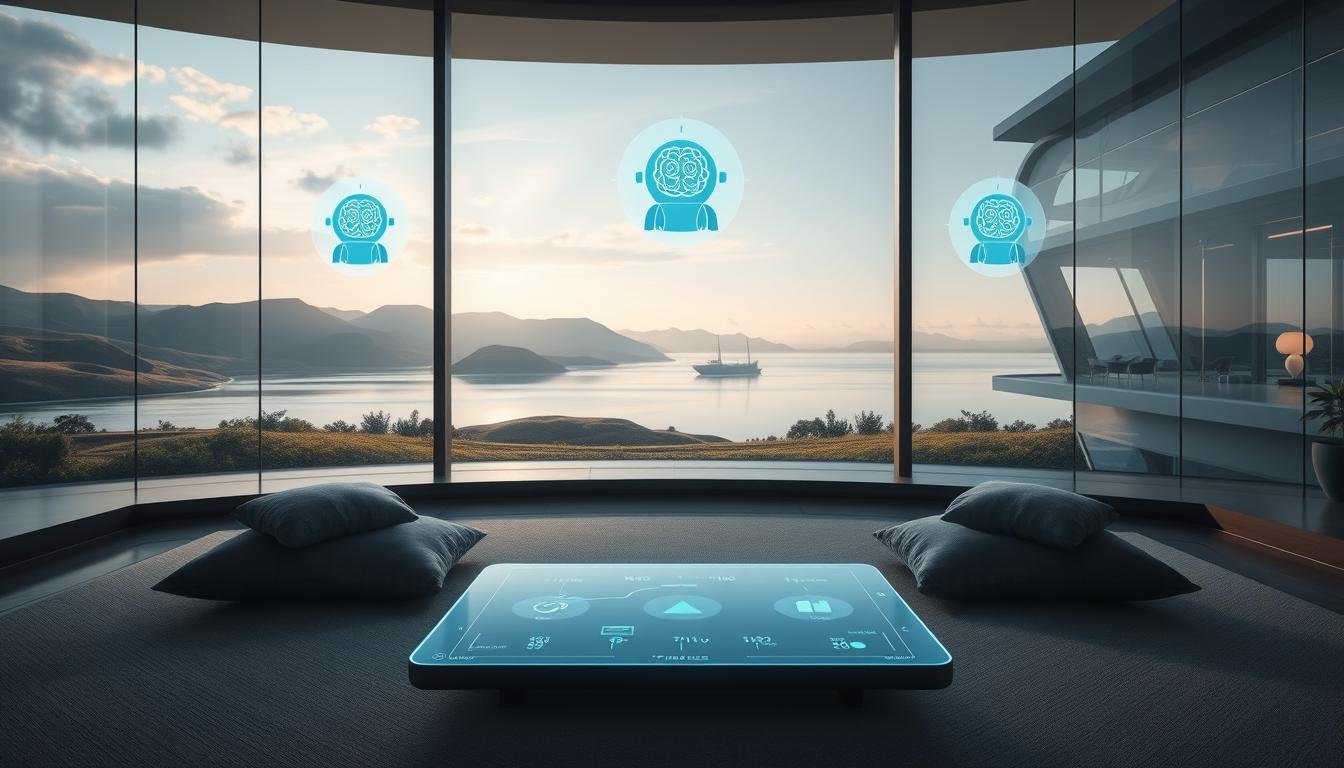AI-Powered Solutions for Overcoming Depression
Imagine a world where mental health care is personalized, precise, and empowering. With advancements in artificial intelligence, this vision is becoming a reality, offering new hope for millions struggling with depression1.
Recent studies, like those from the ENIGMA Consortium, have shown that AI can predict treatment responses with remarkable accuracy2. By analyzing brain scans and integrating data from various sources, AI tools are guiding treatment selections more effectively than ever before.
This approach addresses the traditional trial-and-error method, which can be both time-consuming and disheartening for patients. AI-driven solutions, such as those developed by researchers at USC Stevens INI, are paving the way for targeted therapies like rTMS, which have shown promising results in alleviating symptoms2.
The collaboration among global researchers and institutes underscores the transformative potential of these innovations. As we explore the evolution and future of AI in mental health, one thing is clear: this is a step toward a more compassionate and effective care system.
The Evolution of AI in Mental Health Care
Over the years, mental health care has seen remarkable advancements, with AI emerging as a transformative force. Early research laid the groundwork for modern digital tools, enabling more precise diagnoses and personalized treatments. A study by ENIGMA Consortium demonstrated AI’s ability to predict treatment responses with high accuracy3.
Landmark studies, such as those from USC Stevens INI, have reshaped treatment paradigms in psychiatry. These innovations have shifted from traditional trial-and-error methods to data-driven approaches, improving efficiency and patient outcomes. AI tools like rTMS have shown promising results in alleviating symptoms3.
Contributions from leading institutes have pushed AI research forward. Press releases highlight how AI tools were trialed and refined over time, demonstrating their effectiveness. This evolution is a necessary response to global mental health challenges, offering hope for a more compassionate care system.
Understanding the Global Burden of Depression
Depression casts a long shadow over global health, impacting millions of lives each year4. It is the most common mental disorder worldwide, with approximately a third of people experiencing clinical depression in their lifetime4.
In 2019, about 280 million people suffered from depression globally, making it a leading cause of disability4. This condition not only affects individuals but also poses a significant barrier to accessing quality health care. The economic burden is substantial, with depression accounting for millions of Disability-Adjusted Life Years (DALYs) each year4.
Current research is crucial in understanding depression’s multifaceted nature. Studies have shown that the global incidence of depression increased by nearly 50% from 1990 to 20175. This rise underscores the need for innovative approaches, such as machine learning tools, to improve diagnosis and treatment5.
Collecting and analyzing data from around the world is essential for crafting effective interventions. For instance, the highest age-standardized DALY rate for depression was recorded in sub-Saharan Africa4. This highlights the varying severity and impact of depression across different regions.
Individuals and health systems face significant challenges in managing depression. The disorder is a leading cause of years lived with disability, contributing over 8% in 20105. The economic and social burden is further exacerbated by factors like intimate partner violence and childhood trauma4.
Advancing mental health research is critical for global well-being. By understanding the complexities of depression and leveraging technologies like artificial intelligence, we can develop personalized treatment strategies. This approach not only improves patient outcomes but also reduces the overall burden on health care systems5.
Innovative Brain Stimulation Techniques in Depression Treatment
Brain stimulation is emerging as a groundbreaking approach in treating depression, especially for patients who don’t respond to traditional medications. One such innovation is repetitive transcranial magnetic stimulation (rTMS), an FDA-approved, non-invasive procedure6.
rTMS uses electromagnetic coils to target specific brain regions, stimulating them to improve mood regulation. Studies have shown that rTMS can significantly reduce suicidal thoughts and alleviate symptoms in treatment-resistant cases7.
AI plays a crucial role in optimizing rTMS parameters like frequency and duration, personalizing treatment for each patient. Advanced neuroimaging further refines this process by tailoring stimulation to individual brain structures6.
These advancements are revolutionizing mental health care, offering new hope for those struggling with depression. By integrating AI and neuroimaging, brain stimulation techniques like rTMS represent a significant leap forward in personalized treatment7.
The Role of Neuroimaging and Machine Learning in Diagnosis
Neuroimaging techniques like MRI are revolutionizing how we diagnose depression by uncovering structural and functional differences in the brain8.
Machine learning algorithms analyze vast amounts of imaging data to detect subtle patterns that aren’t visible to the human eye9.
The ENIGMA Consortium has successfully used these methods to identify patients who may benefit from treatments like rTMS8.
AI accelerates diagnosis, reducing the lengthy trial and error in prescribing antidepressants9.
Studies have revealed critical biomarkers underlying mood disorders, enhancing our understanding of depression8.
Combining clinical data with imaging information leads to more accurate diagnoses and personalized treatment plans9.
These technological advancements are crucial for early detection and tailored therapies, offering new hope for patients8.
AI for Depression: Personalized Treatment Strategies
Personalized mental health care is now within reach, thanks to advancements in machine learning. These technologies analyze vast amounts of patient data, including brain scans and clinical histories, to create tailored treatment plans. This approach marks a significant shift from the traditional one-size-fits-all method, offering more precise and effective care.
Recent studies, such as those from the UIC precision psychiatry projects, highlight how machine learning can identify specific depression biotypes. For instance, researchers have identified six distinct biotypes based on brain scans, each responding differently to various treatments10. This personalized strategy not only improves treatment success but also reduces the trial-and-error process, leading to better patient outcomes.
Digital platforms play a crucial role in delivering these customized care plans. Tools like the BiAffect app measure cognitive health through typing behavior, allowing continuous patient assessment between clinic visits10. By integrating advanced technology into mental health care, we can transform patient outcomes, making treatment more accessible and effective.
Clinical Trials and Real-World Research Initiatives
Clinical trials are paving the way for groundbreaking advancements in depression treatment, integrating AI and neuroimaging to test innovative approaches. The PETRUSHKA trial at the University of Oxford stands out for its use of AI tools to personalize antidepressant selection in real time11.
Other notable initiatives include the clinical research programs at UIC and USC, which are validating these approaches through multicenter international trials. These studies emphasize rigorous data collection and trial protocols to ensure reliable results12.
Real-world research initiatives are bridging the gap between laboratory findings and clinical practice. Collaborative efforts among universities, research centers, and hospitals are driving these trials forward, ensuring their effectiveness and scalability.

These trials signify a transformative era in depression treatment, offering personalized and data-driven solutions. By leveraging AI and neuroimaging, researchers are unlocking new possibilities for patients worldwide.
Digital Innovations in Depression Care
Digital tools are revolutionizing mental health care, offering innovative solutions for managing depression. Smartphone apps and AI virtual assistants now provide real-time support, making mental health care more accessible than ever13.
These platforms continuously collect health data, such as mood tracking and behavioral patterns, between clinical visits. For instance, apps like BiAffect monitor typing behavior to assess cognitive health, enabling ongoing patient assessment13.
Digital interventions offer on-demand support, reducing barriers to care. AI voice assistants can provide immediate guidance, helping patients manage symptoms without waiting for an appointment14.
Research from UIC highlights the success of these tools in improving treatment precision. For example, the BiAffect app has demonstrated effectiveness in tracking cognitive changes, leading to more personalized care plans13.
These innovations not only enhance treatment adherence but also monitor mood and cognitive function. AI-driven platforms can detect subtle changes, offering timely interventions that improve outcomes14.
By reducing the need for in-person visits, digital tools alleviate the burden on traditional health systems. They provide cost-effective solutions, making mental health care more sustainable15.
Digital platforms are becoming essential in delivering timely, personalized care. They represent a significant step forward in making mental health care accessible and effective for all13.
Precision Psychiatry: Biotyping and Tailoring Treatments
Precision psychiatry represents a significant shift in mental health care, offering personalized treatment plans based on individual biological and psychological profiles. Unlike traditional approaches that often rely on trial and error, precision psychiatry uses advanced technologies to identify distinct depression biotypes, ensuring more targeted therapies.
Recent studies, including those from Stanford and UIC, have identified six distinct depression biotypes using brain imaging and machine learning16. These biotypes respond differently to various treatments, allowing clinicians to tailor therapies more effectively. For instance, one biotype characterized by overactivity in cognitive areas shows a positive response to venlafaxine, while another benefits more from behavioral talk therapy17.
By combining neuroimaging with machine learning, researchers can predict treatment success with 63% accuracy, compared to 36% without such tools17. This approach not only improves treatment outcomes but also reduces the time spent on ineffective therapies. Patients receive treatments that align closely with their unique condition, leading to faster recovery and better overall health outcomes.
The impact of these refined classifications is profound. Patients who receive personalized treatments experience fewer side effects and higher remission rates. For example, veterans with a specific cognitive biotype showed notable improvement in brain connectivity after just five days of transcranial magnetic stimulation (TMS)17. This underscores the transformative potential of precision psychiatry in modern mental health care.
Enhancing Treatment Accessibility with Advanced Technologies
Advanced technologies are reshaping the mental health landscape, making care more accessible and inclusive than ever before. These innovations are breaking down barriers that once limited access to essential treatments, especially for underserved populations18.
Digital interventions, such as AI virtual coaches and video-based programs, are proving effective in managing conditions like depression and obesity. According to recent studies, AI-delivered self-guided interventions have shown medium to large effects on mental health symptoms19. These tools enable remote consultations and on-demand treatment delivery, reducing the need for in-person visits18.
AI-powered tools are particularly effective in reaching populations with limited access to psychiatric services. For instance, AI virtual coaches provide real-time support, helping individuals manage symptoms without waiting for an appointment18. Automated therapy platforms also enhance treatment adherence and personalize care, ensuring interventions are tailored to individual needs19.
The broader social and economic benefits of improved accessibility are significant. By reducing wait times and enhancing treatment engagement, these technologies promote community health and make mental health care more sustainable18. They alleviate the burden on traditional health systems, offering cost-effective solutions that improve overall well-being19.
These innovations are pivotal in democratizing high-quality mental health care. As the world embraces advanced technologies, the vision of accessible, equitable treatment becomes a reality, transforming lives globally18.
Collaborative Research and Global Partnerships in AI
Global collaboration is the cornerstone of innovation in mental health care, driving advancements in AI solutions. International initiatives, such as the ENIGMA Consortium and the PETRUSHKA trial, exemplify how teamwork accelerates progress in understanding and treating depression20.
These partnerships combine clinical, imaging, and genetic datum to create comprehensive datasets. For instance, the PETRUSHKA trial, conducted in the UK, Canada, and Brazil, demonstrates how diverse data can refine AI algorithms for better treatment outcomes21.
Shared data repositories and international funding, like the support from Brain Canada, are crucial. They enable researchers to access a wealth of information, fostering innovation and reducing duplication of efforts20.
Collaborative research brings diverse perspectives, enhancing study designs. The feasibility study involving 74 patients across nine centers highlights how global efforts can lead to significant breakthroughs, such as a 30% remission rate in the AI group20.
These partnerships are vital for the future of mental health care. By sharing knowledge and resources, the global community can develop more effective, personalized treatments, ensuring better outcomes for all21.
Future Directions for AI-Driven Mental Health Solutions
The future of mental health care is poised for a revolution, with AI technologies leading the charge in innovation and accessibility. Emerging trends suggest that AI will play a pivotal role in integrating multi-modal data, including neuroimaging, genetics, and digital biomarkers, to create highly personalized treatment plans22.
Recent studies highlight the potential of AI to revolutionize depression treatment by analyzing vast amounts of datum, such as electronic health records and behavioral patterns, to detect early signs of mental health conditions23. This approach not only enhances diagnostic accuracy but also enables timely interventions, potentially reducing the global burden of mental illness24.
Looking ahead, advancements in digital diagnostics and remote therapy delivery systems promise to make mental health care more accessible and effective. AI-powered tools are expected to refine predictive models and treatment algorithms, offering more precise and personalized care plans22. These innovations could significantly improve patient outcomes and reduce the global burden of mental health disorders23.
Ongoing research underscores the transformative impact of AI in mental health care. By leveraging advanced technologies, the future of treatment for depression and other conditions looks brighter than ever, promising unprecedented improvements in patient outcomes and accessibility24.
Transforming Mental Health Care: A New Future
Transforming Mental Health Care: A New Future
Mental health care is on the brink of a revolution, driven by groundbreaking advancements in technology and research. Studies like the PETRUSHKA trial and comprehensive neuroimaging research are paving the way for personalized treatment strategies, offering new hope for individuals affected by depression25.
These innovations are reshaping the landscape of mental health care globally. By leveraging advanced technologies, researchers are developing more precise and effective treatments, improving the quality of life for millions26.
Collaborative efforts among global research initiatives are pushing the boundaries of what is possible. Shared data and interdisciplinary approaches are driving the development of new standards for treatment, ensuring that care is more accessible and effective than ever before.
As we look to the future, the integration of AI and digital innovation holds the promise of overcoming long-standing challenges in mental health care. With ongoing support and engagement, these advancements will continue to transform lives, offering hope and improved outcomes for all25.
Share this content:




Post Comment